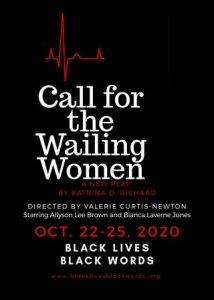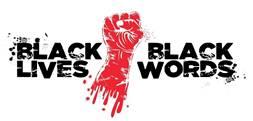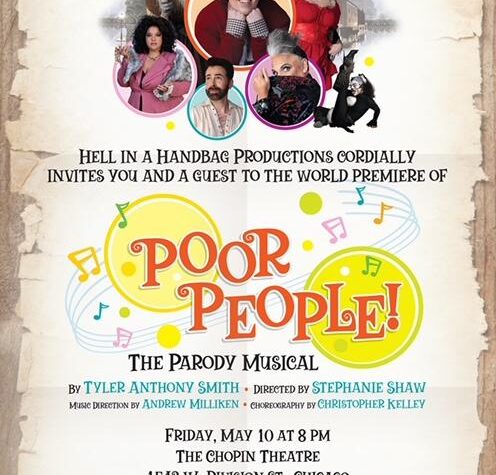
 Highly Recommended **** Powerful, compelling, and incisive, “Call for the Wailing Women” is a performance that is as deep as the river; it tears at your soul. Focusing on the serendipitous collision of two women’s separate experiences with family tragedy, this intense 26-minute livestreamed show is the impressive creation of South Side Chicago playwright Katrina D. RiChard and is seamlessly directed Valerie Curtis-Newton.
Highly Recommended **** Powerful, compelling, and incisive, “Call for the Wailing Women” is a performance that is as deep as the river; it tears at your soul. Focusing on the serendipitous collision of two women’s separate experiences with family tragedy, this intense 26-minute livestreamed show is the impressive creation of South Side Chicago playwright Katrina D. RiChard and is seamlessly directed Valerie Curtis-Newton.
Two African-American mothers, Sandy (Bianca Laverne Jones) and Mary (Allyson Lee Brown) discuss heartbreaks regarding their sons’ lives. The story hinges on the theme of how black America buries its dead, particularly its black men. What is it that they bury? Their body? Their soul? Their body parts? Their past? And what is not being buried: Their dreams and ambitions, their good deeds, their failings, their organs, or our memories of their lives and their tragedies? The show asks the question: How disposable are black men in the larger society? And more generally, what is a person’s life worth to the people who love them—or who want to use them in some fashion in death? Above all, how do the answers to these questions depend on the religious and secular values of the individuals who ask them?
The beginning of the presentation establishes the socioeconomic and class differences between Sandy and Mary. Mary, who is Catholic, is typecast as a nurse with a professional career, whereas Sandy, who is Baptist, is defined as a single mother. Differences in black religious expression become shorthand for distinguishing secular differences in background, culture, and family composition and provide us with some hint about the gulf between these two women’s frames of reference and their motivations for action. For example, black Catholics in Chicago tend to be considered of higher social status among African-Americans than members of the Protestant denominations. The traditionally quieter style of Catholicism with its emphasis on good works can be contrasted with the louder Gospel style of the Baptist faith and its emphasis on grace as the means of salvation. Another divide has to do with a black parent’s investment in their child’s future material success as evinced by their willingness to pay for a Catholic school education, especially in low-income neighborhoods where the public schools are considered inferior. The flip side is that Catholics may often be looked upon by non-Catholic Christians as being “holier than thou”, too much into the “rat race”, or acting “too white.” The bottom line is that the banter between Sandy and Mary adroitly illustrates how growing up in a particular church and being raised in a particular social class within the African-American community can have a distinct and lasting impact on one’s life trajectory and view of the world—including how to raise a child to adulthood.
Yet Sandy and Mary turn out to be much more alike than different: Yes, they butt heads and can both be stubborn and want the other person to see things their way. But in the end, they are two mothers grieving over their dead and dying sons. What bridges them is the bond of motherhood. By means of excellent acting and well-timed banter, Jones and Brown deftly lay bare the mystery and uncertainty of what we call life and death, and this reference to the known, unknown, and unknowable is what supersedes the women’s social cleavages. At the same time, their dialogue exposes layers of issues concerning identity that can serve to unite or divide black people, such as attributes and expectations surrounding race, class, religion, sexual orientation, and gender. As was discussed in the aftertalk, there are no heroes or villains here: just honest ways of understanding other people’s lives, their hardships, and their relationships.
RiChard’s modern, Afrocentric take on death and burial customs is ostensibly based on Euripides’ play “The Suppliants” and speaks to how insights gathered from Ancient Greece can be applied to the present day. According to Wikipedia,
“In ancient Greek literature, funeral rites are highly important to the citizenry. The Iliad contains scenes of fighters in violent conflict over the treatment of corpses…. People are often willing to fight and risk dying to obtain the bodies of the dead. ‘The Suppliants’ takes this characteristic even further, showing a whole city willing to wage war in order to retrieve the bodies of strangers. The theme of forbidding dead bodies from burial occurs many times in ancient Greek literature.”
Like “The Suppliants”, “Call for the Wailing Women” shows us how mothers have dealt with love, loss, and hurt. More to the point, the current production points up varied perspectives on grief, faith, dignity, and acts of daily living in relation to the unfulfilled promises of young black men: their lives cut short in the prime of life and their deaths mourned much too soon.
“Call for the Wailing Women” is a production of Black Lives/Black Words, a Chicago-based activist theater company “that provides local black creatives with an artistic platform.” As part of its virtual series “Plays for the People”, “Call for the Wailing Women” will be livestreamed on Zoom through Sunday, October 25, 2020.
All performances are from 7:00 – 8:00 p.m.
Tickets range from $10 to $16.96. For more information or to purchase tickets for this show or other shows in the series, please visit: https://www.blacklivesblackwords.org/get-tickets.






More Stories
“Poor People ! The Parody Musical” Reviewed by Julia W. Rath
“Last Stop on Market Street”
“Miz Cracker” at The Venus Cabaret